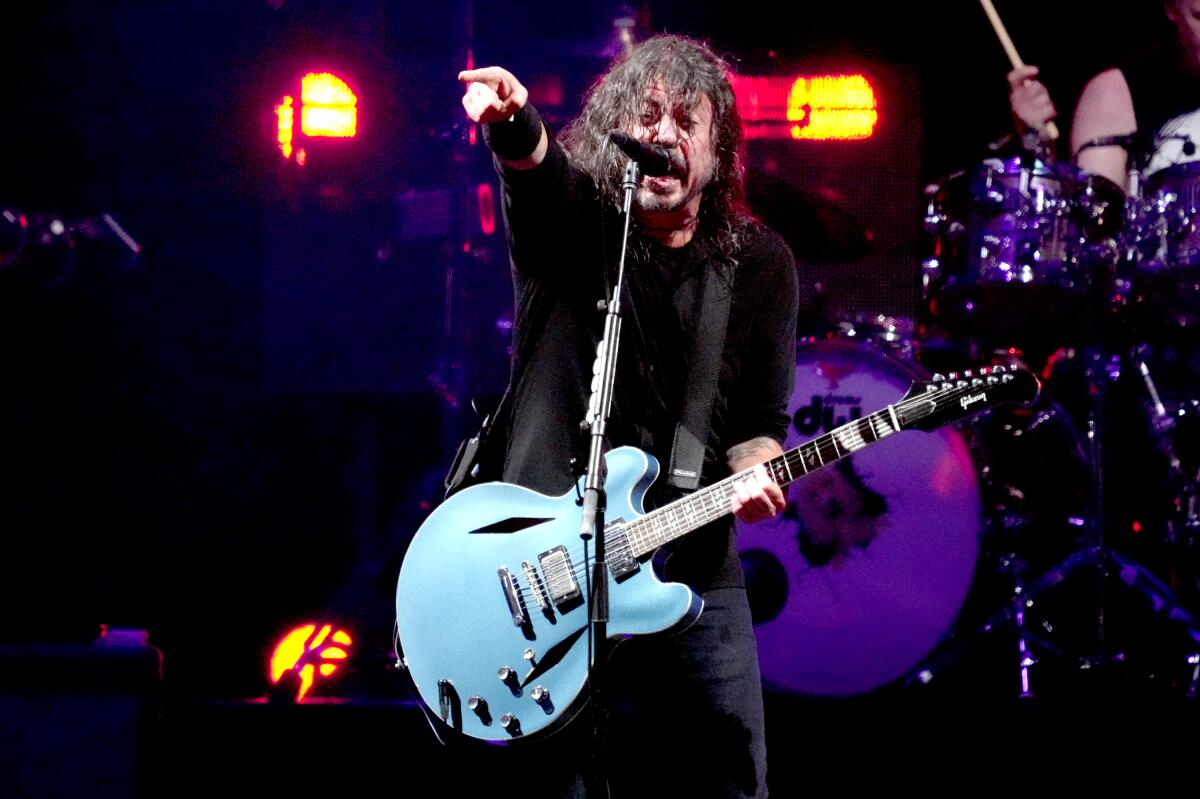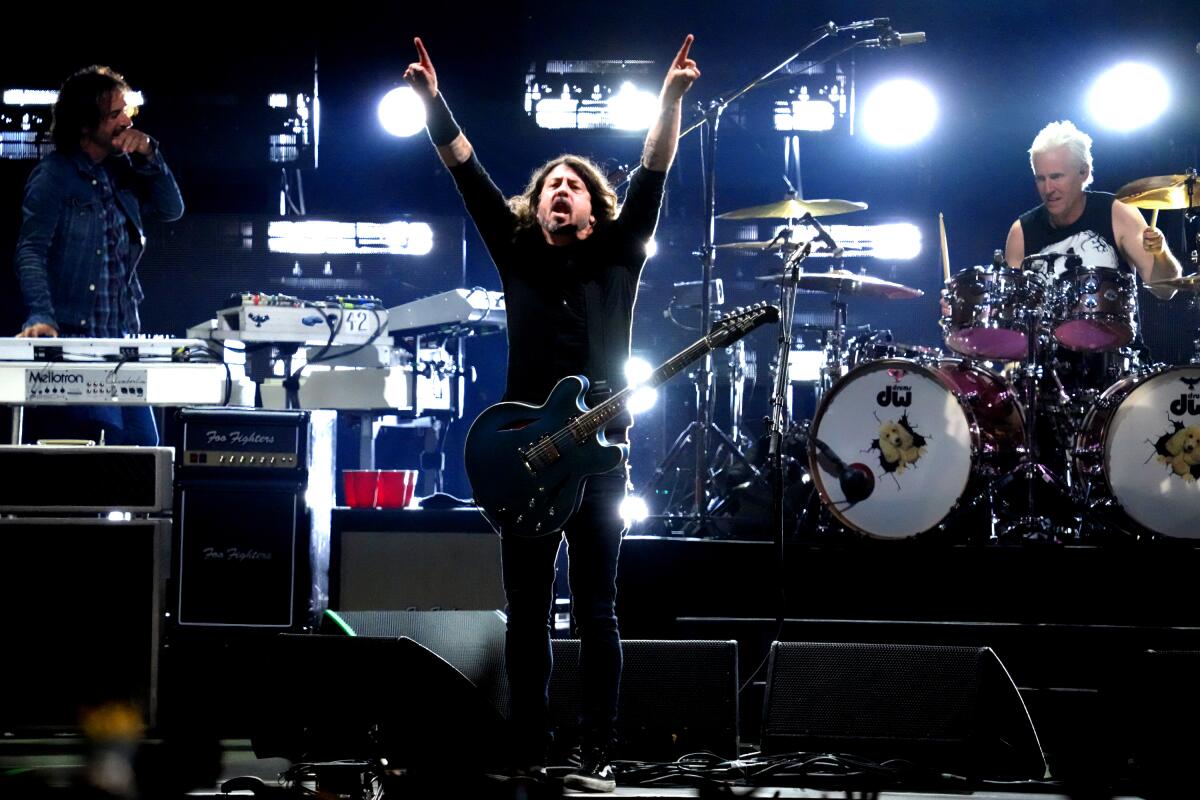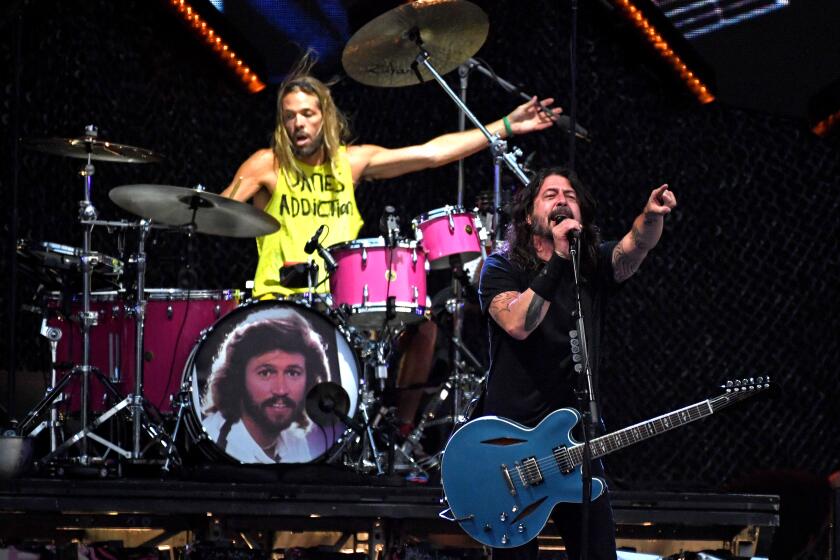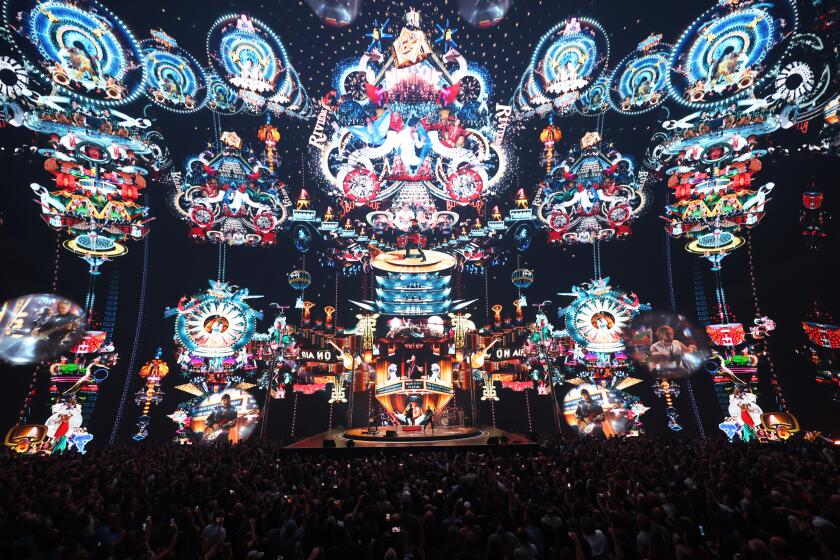In ‘Taylor Hawkins’ backyard,’ the Foo Fighters power through grief at Ohana festival

- Share via
“Tonight,” Dave Grohl said, “we are in Taylor Hawkins’ backyard.”
The Foo Fighters frontman was about 90 minutes into his band’s headlining set Sunday night at the Ohana festival in Dana Point, which meant that these Rock and Roll Hall of Famers had come to the moment in their show when they perform “Aurora,” from their 1999 album “There Is Nothing Left to Lose.”
Dreamy but propulsive, it’s the first song Grohl wrote with Hawkins, the longtime Foos drummer who died last year at age 50; since returning to the road in May, the Los Angeles-based band has been playing it every night in his honor. Yet because of the location of this gig — at Doheny State Beach, just miles from Hawkins’ hometown of Laguna Beach — the song took on added weight Sunday.
“I came down here with him every once in a while,” Grohl told the crowd of his late bandmate with the SoCal attitude and surfer’s good looks. “Hung out at the house he grew up in, hung out with his mom, hung out with his dad, hung out with his brother and his sister. And it was weird, because I never really understood Taylor Hawkins until I f—ing came to Laguna,” he added with a laugh. “And then I was like, OK, I get it — that’s who you are.”
As he spoke, Grohl idly strummed his electric guitar. “So I knew that tonight would be kind of heavy,” he continued, his voice thickening with emotion, “because we’re here, where Taylor grew up. But I want this next song to be a celebration of his life, all right?”
Taylor Hawkins, who died Friday at age 50, gave the Foo Fighters’ earnest anthems a palpable sense of fun, swagger and sex appeal.
More than just a drummer, Hawkins — whom Grohl once described as “either my twin or my spirit animal or my best friend” — was crucial to the whole Foo Fighters enterprise; his jovial demeanor and his obsession with rock history powered the band’s music as surely as the instrumental chops that led Grohl to trust him at the kit following Grohl’s own stint as the world-class drummer behind Kurt Cobain in Nirvana.
Why carry on without him? In a sense, that’s simply what successful rock bands do: This past weekend, U2 launched a ballyhooed new residency at Sphere in Las Vegas minus founding drummer Larry Mullen Jr., who’s sitting out the shows thanks to an injury; later this month, the Rolling Stones will release a new LP two years after Charlie Watts died.
Yet survival has been a central theme of Grohl’s career in particular since he formed Foo Fighters in the wake of Cobain’s death in 1994. The devastation of that loss — as well as the determination to move beyond it — permeated the band’s self-titled debut. Nearly three decades later, the Foos’ latest album, “But Here We Are,” ponders the absence left behind by Hawkins and by Grohl’s mother, who also died last year.
On opening night at the $2.3-billion Sphere concert hall, the visuals projected onto the high-def walls behind and above U2 were a show unto themselves.
“It came in a flash / It came out of nowhere,” Grohl sings in the surging “Rescued,” which the band played Sunday along with “Under You,” a zippy rave-up in which the singer pores over “pictures of us sharing songs and cigarettes.” In a grim yet telling paradox, the LP — a likely contender for an album of the year nod at February’s Grammy Awards — is the Foos’ most alive-sounding since 2011’s “Wasting Light,” which they reached back to at Ohana for a blistering rendition of “Walk” that had Grohl shrieking, “I never wanna die!” until a vein looked like it was about to burst from his forehead.
Indeed, the frontman, whose enthused-Muppet vibe has only deepened as he’s entered his mid-50s, framed the band’s endurance in numerous ways here, mock-complaining to the audience about the challenge of squeezing 28 years into a two-hour concert and about the difficulty of choosing which of the group’s 190 songs to play.

One reason the Foos’ success has matched Grohl’s commitment — after playing arenas and amphitheaters this year, they’ll tour stadiums in 2024, including two nights at L.A.’s BMO Stadium in August — is their ability to connect generations in an era when rock music doesn’t shape youth culture as it did in Nirvana’s heyday.
At Ohana — founded by Pearl Jam’s Eddie Vedder, whom Grohl thanked for taking Foo Fighters on their first tour in 1995 — the band peppered its songs with riffs from classics such as Black Sabbath’s “Paranoid” and “Ain’t Talkin’ ’Bout Love” by Van Halen (whose Sammy Hagar turned up at the festival on Friday to sing “Why Can’t This Be Love” with the Killers). Grohl introduced Hawkins’ replacement, the veteran session and touring drummer Josh Freese, by having him lead the band through songs by Devo and Nine Inch Nails, two of the many acts Freese played with before joining Foo Fighters; later, after Grohl spied an audience member who appeared to need help, he sang the first verse of Led Zeppelin’s “Stairway to Heaven” as security made its way to the fan.
“Is that situation figured out?” he asked. “Thank God, because that’s a f—ing long-ass song.”
Yet the Foos were far from a throwback act as they muscled through hits including “All My Life,” “Times Like These” and “Monkey Wrench” for a crowd with more teenagers and 20-somethings than you might’ve expected. The music was speedy and precise, but even at the band’s most well-practiced — at one point Grohl literally demonstrated his technique for screaming without doing permanent damage to his voice — the songs had a rawness of feeling that never quite smoothed out.
After the tribute to Hawkins with “Aurora,” the band played “Best of You,” an anthem-like number from 2005 about how the only way to overcome trauma is to acknowledge its cost. “It’s real, the pain you feel,” Grohl sang against Freese’s battering drums, and he sounded like he could’ve written the words yesterday.
More to Read
The biggest entertainment stories
Get our big stories about Hollywood, film, television, music, arts, culture and more right in your inbox as soon as they publish.
You may occasionally receive promotional content from the Los Angeles Times.













